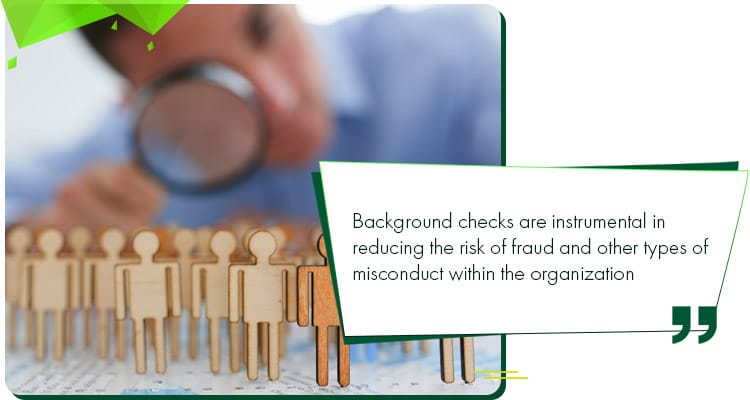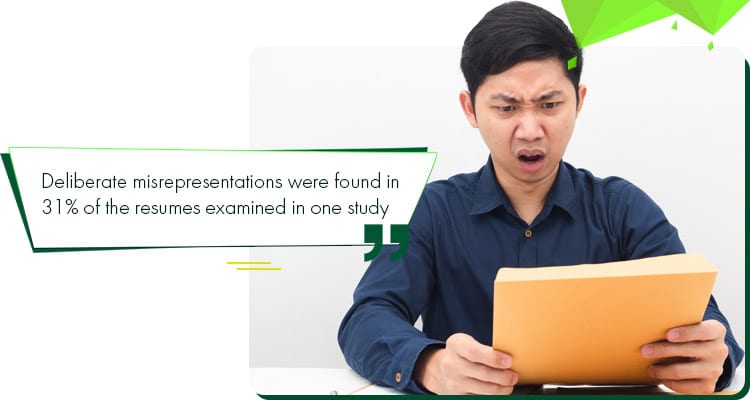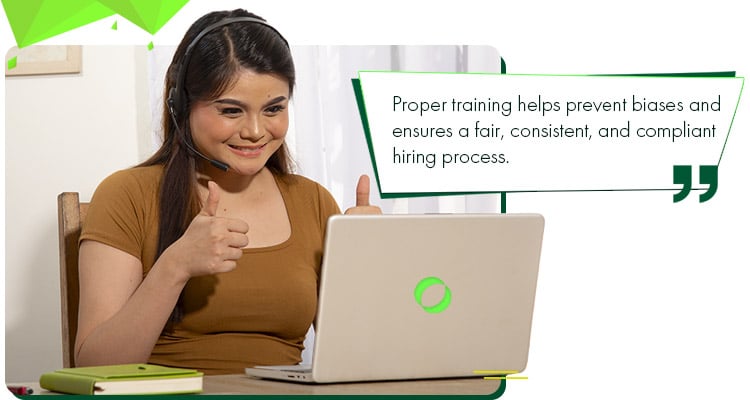Employment background checks are a critical component of the hiring process, ensuring that organizations make informed decisions about the candidates they choose to bring on board. As companies increasingly to look forward to outsource human resources tasks, employee verification is very important. This comprehensive guide will explore why background checks are essential, the different types available, and how to conduct them effectively, particularly focusing on the best practices in Australia.
Why Are Background Checks Important in the Hiring Process?
-
Ensuring Safety and Integrity in the Workplace
Background checks help maintain a safe and secure work environment by screening potential employees for past criminal activities, misconduct, or other risks that could harm the workplace’s integrity or safety. This is crucial in roles that involve interacting with vulnerable populations or handling sensitive information, even or especially for remote roles like a virtual personal assistant.
-
Compliance with Legal and Industry Standards
Conducting background checks helps organizations comply with various legal and industry-specific regulations, preventing legal liabilities such as negligent hiring lawsuits. For instance, certain positions may require a clean criminal record or specific professional licenses to comply with industry standards.
-
Minimizing Risks of Fraud and Misconduct
Background checks are instrumental in reducing the risk of fraud and other types of misconduct within the organization. By verifying past employment details, criminal records, and educational qualifications, employers can significantly mitigate the risks associated with deceitful practices, whether they hire in-house or outsource. Human resources, after all, can be the most unpredictable facet of any business.

Resume and CV Verification
Prevalence of Resume Fraud
Resume fraud is a significant issue, with various studies indicating that a substantial number of job applicants include misleading or false information on their resumes. Common falsifications include exaggerated responsibilities, incorrect employment durations, and fabricated qualifications.
Impact of Inaccurate Resumes
Hiring based on inaccurate resumes can lead to poor job performance, legal issues, and increased turnover, which in turn affects the organization’s efficiency and reputation.
Statistical Insights/ Extent of Misrepresentation
A substantial number of resumes contain inaccuracies. For example, one study reported that 55% of resumes included erroneous information.This high incidence indicates that inaccuracies in resumes are not isolated incidents but rather a widespread issue. The inaccuracies range from minor clerical errors to deliberate misrepresentations. Deliberate misrepresentations were found in 31% of the resumes examined in one study, suggesting that a significant portion of job applicants intentionally falsify or embellish details about their professional experience and qualifications.

Common Areas of Misrepresentation
The most frequently misrepresented areas in resumes are employment history, skills, and educational qualifications.
Understanding Different Types of Background Checks for Employment
- Criminal History Checks/Criminal Record Check: Criminal history checks and criminal record checks are often used interchangeably to refer to investigations into an applicant’s past criminal offenses. These checks are crucial for positions that require high levels of trust and integrity.
- Employment History Verification and Reference Check: Verifying a candidate’s employment history confirms their work experience and performance in previous roles. Reference checks further provide insights into the candidate’s work ethic and professional conduct from former supervisors or colleagues.
- Educational Background and Qualification Verification: This verification step ensures that the candidate holds the degrees or certifications they claim on their resume. This type of check is essential for positions requiring specific educational qualifications or professional licenses.
- Employment Credit Check: An employment credit check involves reviewing a candidate’s credit report to gain insights into their financial responsibility. This report typically includes details such as payment history on loans and credit cards, public records of bankruptcies or judgments, and overall credit utilization. By analyzing this information, employers can assess a candidate’s ability to handle financial matters, which may be relevant for certain positions, especially those involving handling company funds or assets.
How to Conduct Background Checks Effectively
Step 1: Establish a Background Check Policy
Before initiating any background checks, develop a clear and consistent policy that outlines:
- The types of checks you will conduct (e.g., criminal records, education verification, employment history).
- The positions for which these checks are necessary.
- How the results will influence hiring decisions.
This policy helps ensure fairness and compliance with legal standards.
Step 2: Obtain Candidate Consent
Always obtain written consent from the candidate before starting the background check process. This is not only a best practice but also a legal requirement under different international laws . Explain the scope and purpose of the background check clearly to the candidate. It’s mandatory for employers in Australia to obtain written consent from candidates before conducting any background checks. This practice ensures transparency and maintains compliance with privacy regulations.
Step 3: Use Reliable Background Check Providers
Select a reputable and accredited background check provider. Ensure that the provider complies with all relevant laws and regulations, uses up-to-date and accurate sources for their information. This step is crucial to avoid errors and ensure the reliability of the data obtained.
Step 4: Focus on Job-Relevant Information
Tailor the background checks to the requirements of the job. For instance, financial roles may necessitate a credit check, while positions involving driving might require a review of the candidate’s driving record. This targeted approach helps minimize the risk of discrimination and focuses on the essential qualifications and risks related to the specific position.
Step 5: Comply with Legal Standards
Ensure compliance with all applicable laws and similar regulations in other jurisdictions. This includes understanding what can and cannot be included in a background check, such as the prohibition of considering certain types of criminal records after a specific period.
Step 6: Maintain Confidentiality and Data Security
Protect the privacy and security of all personal information obtained during the background check process. Implement robust physical and digital security measures to prevent unauthorized access to or disclosure of sensitive data
Step 7: Train HR Personnel
Educate your HR team and hiring managers on the legal requirements, ethical considerations, and technical aspects of conducting background checks. Proper training helps prevent biases and ensures a fair, consistent, and compliant hiring process.

Step 8: Communicate Results and Provide an Opportunity for Explanation
If the background check uncovers potentially disqualifying information, communicate these findings to the candidate. Allow them the opportunity to explain or dispute the information before making a final hiring decision. This step is crucial for fairness and compliance and encompasses even international standards.
Step 9: Review and Update Your Background Check Policy Regularly
Laws and best practices surrounding employment background checks can evolve. Regularly review and update your policies and practices to ensure ongoing compliance and relevance to your current hiring needs.
Step 10: Document the Process
Keep detailed records of the background check process, including the checks performed, the rationale for their scope, consent forms, and communications with candidates. Documentation can be crucial for defending against potential legal challenges and for auditing your compliance with your own policies and legal requirements.
What about Social Media Checks?
Social media has become an undeniable part of our lives, and employers are increasingly turning to these platforms to learn more about potential hires. While social media checks can offer valuable insights, they also raise concerns about privacy and potential bias.
Evaluating Candidates’ Online Behavior:
A Window into Character: Social media profiles can reveal a candidate’s personality, communication style, and interests. This can help employers assess cultural fit and soft skills that may not be readily apparent in a resume or interview.
Verifying Information: Social media can corroborate a candidate’s claims about skills, experience, and education. For example, professional affiliations on LinkedIn can support a candidate’s work history.
Identifying Red Flags: Public posts may raise concerns about the candidate’s judgment, professionalism, or potential for workplace conflicts. Examples include discriminatory language, illegal activity, or negative comments about past employers.
Balancing Relevance with Privacy:
Focus on Job-Related Aspects: Social media screening should target information directly relevant to the job requirements and company culture.
Transparency is Key: If social media checks are part of the hiring process, it’s crucial to inform candidates beforehand and explain what kind of information is being considered.
Respecting Privacy Boundaries: Private social media accounts or posts unrelated to the job should not be accessed.
Moving Forwards
Employment background checks are essential to a robust hiring process. They empower employers to make informed decisions that prioritize workplace safety, mitigate potential liabilities, and ensure a strong company culture. By strategically utilizing various background checks, such as employment history verification, reference checks, and, where relevant, credit checks, organizations gain a comprehensive understanding of a candidate’s qualifications and character. However, adhering to legal and ethical standards is paramount. This includes following data privacy regulations, obtaining candidate authorization, and focusing checks on job-related criteria. Ultimately, a balanced approach to background checks fosters a win-win situation: safeguarding the organization while ensuring fairness and transparency for all candidates.

Frequently Asked Questions:
What are the Right Background Check Services and Tools?
Choosing the right background screening companies and tools is crucial for conducting thorough and compliant checks, especially when you hire remote talent like outsourcing to the Philippines.
Whether you’re hiring locally or outsourcing to the Philippines or other countries abroad, employers should look for services that offer comprehensive checks and adhere to compliance and other relevant laws.
How Long Do Checks Take?
The turnaround time for background checks can vary significantly depending on the type of check and the depth of the investigation required. Employers should plan accordingly to ensure timely hiring processes.
What Can Employers Legally Probe Into When Doing a Background Check?
Employers can legally look up a candidate’s criminal record, employment history, education, credit history, and more, depending on the job’s requirements and applicable laws.
How Can Applicants Prepare for a Background Check?
Applicants can prepare by ensuring their information is accurate and up-to-date, understanding their rights under the applicable laws, and being prepared to provide explanations for any potential red flags that may arise.
Can a Job Offer be Revoked Based on Background Check Findings?
Yes, a job offer can be revoked based on the findings of a background check if the discovered information directly impacts the candidate’s ability to perform the job safely and effectively. However, employers must follow fair hiring practices and provide an opportunity for the candidate to dispute any inaccurate findings.
Can you do background checks on your own?
While conducting your own background checks may seem cost-effective, it presents several drawbacks. Firstly, this compromises accuracy and completeness. You lack access to the comprehensive databases and verification tools professional companies utilize. Secondly, legal compliance becomes a burden. Keeping up with fair hiring regulations and ensuring information obtained adheres to data privacy laws is complex. Finally, unconscious bias can creep in during your search, potentially leading to unfair disqualification of qualified candidates.
- Need AI prompts that can make the screening process easier? Get the full AI list here.
- How about a list of 2024’s top business apps to keep your team compliant and on-track? Check it out here.
- Whenever you’re ready to start hiring world-class full-time virtual staff at 40%-60% cost savings AND with lifetime support, head over here.
- View Remote Staff’s carefully vetted and highly talented virtual staff here.
Co-Founder and CEO of Remote Staff. 16-year Pioneer in the Virtual Talent Space –Connecting You with Top Performers. #RemoteStaff looks after your #business. Looking after your team is looking after your business.





















